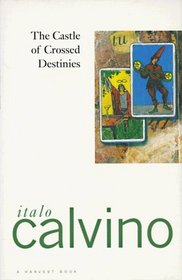Helpful Score: 1
This is kind of a splendid book. It is demanding; the reader must engage with it, examining each card as it is revealed and disputing its meaning with the narrator. It also helps to be well-versed in folklore and literature, both because recognizing many of the tales makes them more comprehensible and because Calvino's style is a strange, almost challenging mix of archaic and modern literary styles that sits uneasily on genre shelves.
It actually reminds me quite a bit of Catherynne M. Valente's two-volume novel The Orphan's Tales; enough, in fact, that I wonder if she was inspired by this work. Neither novel is quite a novel, per se, but more a collection of folk tales (or short stories in the form of folk tales) wound around each other through a magical framing device; but while many readers would probably enjoy the books more by reading them that way, they ARE more than the sum of their parts. Both site themselves within and comment on the greater body of world mythology; in both the narrator is just as much a character to figure out as any of the people he/she is discussing, and it is the narrator's story that is the heart of the book.
Calvino's book is not perfect; the first section, in the castle, is quite a bit more polished and satisfying as a puzzle than the second half in the tavern. The stories in the first half fit together organically, each leading into the next one and fitting together with all the others that came before in the crossword puzzle effect mentioned in the description; in the second half Calvino could not bring order to the chaos of cards, and while he made that chaos part of the novel's structure it still failed to satisfy. But despite (or possibly because of) its failings it is splendid. Glorious even. Pure, inventive literary fun.
It actually reminds me quite a bit of Catherynne M. Valente's two-volume novel The Orphan's Tales; enough, in fact, that I wonder if she was inspired by this work. Neither novel is quite a novel, per se, but more a collection of folk tales (or short stories in the form of folk tales) wound around each other through a magical framing device; but while many readers would probably enjoy the books more by reading them that way, they ARE more than the sum of their parts. Both site themselves within and comment on the greater body of world mythology; in both the narrator is just as much a character to figure out as any of the people he/she is discussing, and it is the narrator's story that is the heart of the book.
Calvino's book is not perfect; the first section, in the castle, is quite a bit more polished and satisfying as a puzzle than the second half in the tavern. The stories in the first half fit together organically, each leading into the next one and fitting together with all the others that came before in the crossword puzzle effect mentioned in the description; in the second half Calvino could not bring order to the chaos of cards, and while he made that chaos part of the novel's structure it still failed to satisfy. But despite (or possibly because of) its failings it is splendid. Glorious even. Pure, inventive literary fun.




